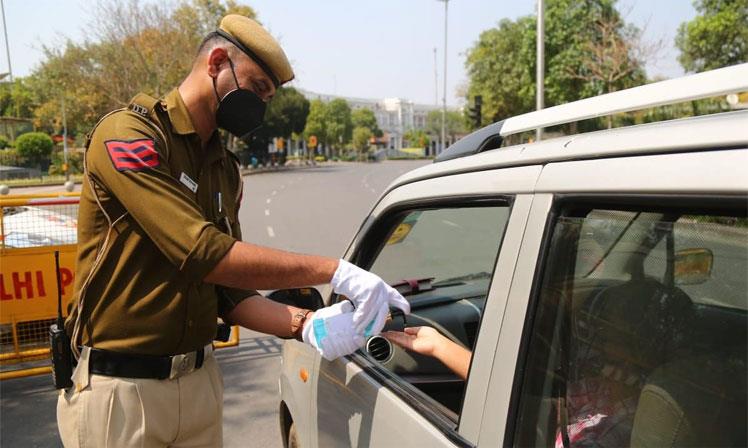
Policing a Pandemic: Valour beyond crimson splendour
By R. K. Pachnanda
In his address to the nation, the Prime Minister saluted the corona warriors -- the health workers, who passionately treated the patients and saw to medical care, and the police personnel, who not only, at the risk to their lives, worked round the clock to enforce lockdowns and ensure public safety but also did yeoman's service by cooking and distributing food and medicines among the poor and needy.
The entire nation, at the clarion call of the Prime Minister, resonated, in unison, by clapping and, later, lighting of lamps, to applaud these warriors. The defence forces, too, placed wreaths at the National Police Memorial to honour the gallant police personnel.
Such was the nation's resounding gratitude to the police personnel for braving the journey to protect and care for citizens. Our police leaders led ably with unflinching resolve and determination, adapted deftly to different situations, performed with dependable precision and well avoided any "analysis paralysis". Not only did they protect the public, but also took measures to preserve their own force by staggering deployment, utilising a percentage of the workforce at a time and improvising other measures.
Despite this there were many cases of infections in the police, due to exposure while enforcing social distancing, protecting frontline workers and hospitals, dealing with the migrant crisis and policing in congested localities, market places, slums and containment zones. Hence police leaders, in their own way, ensured awareness, in their respective forces, about the virus, took measures to build immunity, enforced standard operating procedures on internal health management and on preventive steps like adopting physical distancing in barracks, enforcing cleanliness and hygiene practices, executed quarantine protocols and protocols for police station visitors, arrest and seizure, handling of dead bodies (for road traffic accidents or unnatural deaths), inquest, post-mortem and duty deployment, be it while enforcing law and order, crowd control, 'naka' checking, patrolling or performing VIP or traffic duties.
In the Central Armed Police Forces, all the Composite Hospitals were admitting and treating Covid patients. The ITBP started the first quarantine facility, near Chawala in Delhi, where all passengers arriving by international flights, were sent for quarantine, and also set up a 10,000 bedded Covid hospital in Delhi. Tele-medicine services were being provided, information was being disseminated through different online platforms and protocols were instituted for regular health checkups by all the forces. Organizations also carried out training without disruption by insulating trainees and instructors from external exposure.
Preparedness training was also extended to the families of police personnel who were also educated about safety norms. Essential items were being supplied at their doorstep. Wellness centres were set up in police colonies. Procedures were formulated for sanitization of offices, Police Stations, armouries and vehicles. Those above a certain age were asked to work from or remain at home. The 14-day quarantine rule, after returning from leave, was strictly followed. Covid helplines were set up. There was regular communication with affected personnel to reduce occupational stress and improve motivation. Some leaders took more innovative steps to keep their personnel safe and infuse confidence and a high morale.
Police personnel have braved the frontline without reserve, compromising their own safety to care for others. They have exemplified true courage; one that is not made solely of brutal force, but one that is born of and sustained by, the synergy of head, heart and hand and the firm resolve of virtue and reason. They have been executing their duties with aplomb and serving the public with exemplary grit, fortitude and composure during this pandemic.
It is these indomitable police efforts for the society which has, today, brought the police and public together in the enduring effort for safety in this most trying, challenging and unprecedented catastrophe -- the Covid-19 pandemic. Perhaps, the congruence of people and their caretakers is one silver lining of this dark menacing cloud. It was community policing at its best, and was also in tune with Prime Minister Modi's vision of a peoples' police -- a police of the people and for the people.
(The writer is a former Director General ITBP. His views are personal)
Leave a comment: (Your email will not be published)